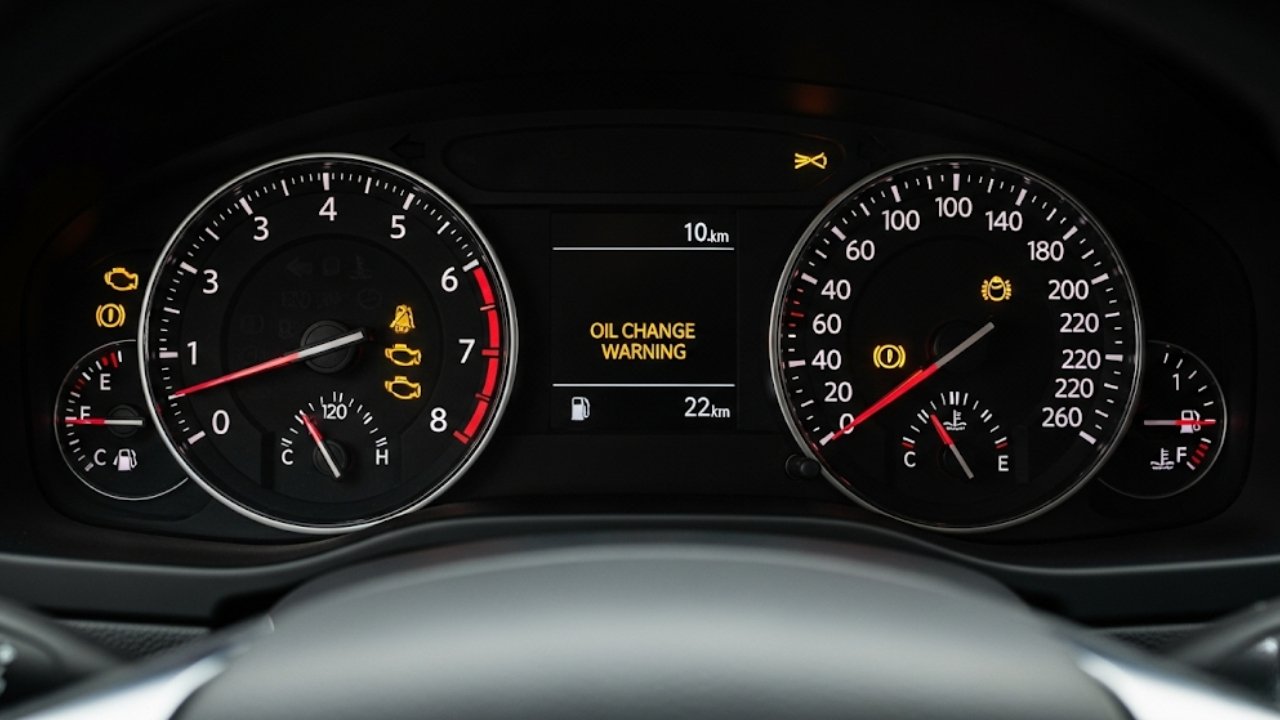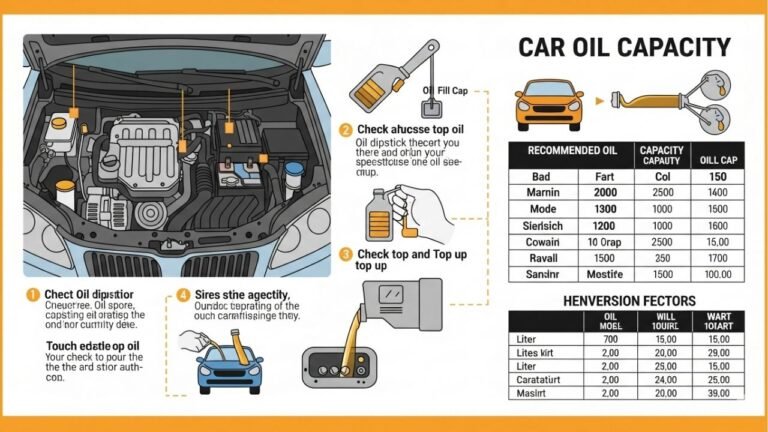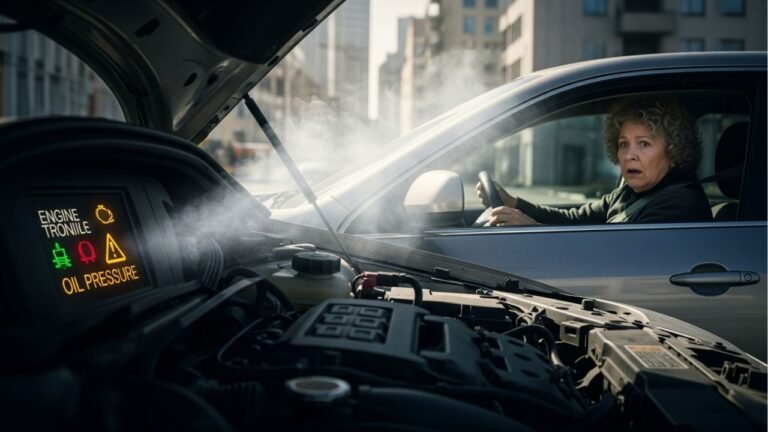When Your Car Talks: Signs Your Car Needs Oil Change

Ever tried skipping breakfast and running a marathon? Your body would scream in protest. That’s what your engine goes through without fresh oil. You might not hear it at first, but the wear adds up. And unlike a hungry belly, your engine won’t just growl—it’ll grind, choke, and maybe even die.
This guide isn’t just for gearheads. It’s for everyday drivers who just want their car to keep running smoothly. You don’t need to know every bolt and piston to understand when something’s off. All you need is a little awareness and some friendly advice—like this article.
So, if you’ve ever asked yourself, “How do I know it’s time?”, keep reading. Because spotting the signs your car needs oil change early can save you from a much bigger headache (and a lighter wallet) later.
1. The Oil Change Light Isn’t Just a Suggestion

That little oil can icon with a drip? Yeah, that’s your car yelling, “Help me!” Many people ignore this light because it doesn’t feel urgent. But it’s like your body running a fever—a small signal of a deeper problem.
When this light comes on, your car is telling you that:
-
Oil is dirty or degraded
-
There’s too little oil
-
Or sometimes, the pressure is too low
Don’t let this be background noise. Modern cars are smart, and this is your earliest warning sign. If you wait too long, that light could be followed by smoke, noise, or worse—a dead engine.
Pro Tip:
Check your owner’s manual for oil change intervals, but always trust your car’s signals first.
2. Strange Engine Noises—Like a Metal Orchestra
Remember the last time you heard your car making odd clicking or ticking sounds? That could be your engine crying out for clean oil.
Oil lubricates every moving part inside your engine. Without it, metal grinds on metal. It’s not just unpleasant—it’s destructive.
I once had a 2010 Corolla that started making a ticking noise when I accelerated. I brushed it off for a week. Big mistake. The mechanic later said the oil was “black as tar.” Lesson learned: Don’t ignore those odd sounds.
Here’s what to listen for:
-
Ticking when you start the engine
-
Louder-than-usual idle
-
Knocking or grinding under the hood
These aren’t normal. If your engine sounds like a washing machine full of rocks, it’s definitely time for an oil change.
3. Oil Looks Like BBQ Sauce, Not Olive Oil
If you’re up for a small task, check your dipstick. It only takes a minute and it tells you everything.
Here’s what you’ll need:
-
A clean paper towel
-
A flat surface to park
-
The engine turned off for at least 5 minutes
What to look for:
| Condition | Color | What It Means |
|---|---|---|
| Fresh Oil | Amber / Honey | All good, like olive oil |
| Used Oil | Dark Brown | Okay if not too thick |
| Dirty Oil | Black, Gritty | Needs to be changed ASAP |
| Milky Oil | Creamy / Frothy | Possible coolant leak—big problem |
If your oil looks thick, sludgy, or smells burnt, don’t wait. That’s one of the clearest signs your car needs oil change immediately.
4. Exhaust Smoke—Not Just Cold Weather Steam
In winter, it’s normal to see a bit of vapor from your exhaust. But if it’s warm outside and you see blue or gray smoke, that’s oil burning.
Burning oil doesn’t just mean a bad smell. It usually points to:
-
Old oil breaking down
-
Engine seals wearing out
-
Oil leaking into the combustion chamber
I had a neighbor with an old Honda Civic. One day, her car left a smoke trail that looked like a cartoon getaway car. She laughed it off, but within a week, her engine seized up on the highway. The culprit? Old oil that hadn’t been changed in 9 months.
5. Your Engine Feels Sluggish or Rough
Ever notice your car just doesn’t have the same get-up-and-go as before?
Old oil doesn’t lubricate well. And that means friction, heat, and slower response times. You’ll feel it when:
-
Your car hesitates when you press the gas
-
The engine vibrates more than usual
-
It feels rough shifting gears
Think of oil like coffee for your engine. Without it, the whole system drags. You might still move, but it won’t feel smooth. If you’ve been driving the same car for a while, you’ll feel this change before you even hear it.
6. You Can Smell Something Burnt
This one hits close to home—literally. Ever had that moment where you sniff the air and think, “Did something catch fire?” That burnt smell might be oil overheating or leaking onto hot engine parts.
Here’s how it happens:
-
Old oil loses viscosity and can’t cool the engine
-
Heat builds up, cooking the oil
-
Sometimes, oil drips onto hot parts and sizzles
Not only is this a red flag, but it can also be a serious fire hazard. If you’re driving and notice a strong, sharp burning smell, pull over and check your oil immediately.
7. Bad Fuel Economy—Paying More, Getting Less
If your car feels like it’s guzzling gas for no reason, the problem might not be your engine—it might be your oil.
When oil thickens or becomes contaminated, your engine has to work harder. That means:
-
More fuel burned per mile
-
Sluggish performance
-
Extra stress on engine parts
According to a study by the Society of Automotive Engineers, using clean oil can improve fuel efficiency by 1–2%. Doesn’t sound like much? Multiply that over a few months and that’s a full tank or two saved.
Changing your oil is like taking off a backpack full of bricks—everything runs easier and more efficiently.
8. It’s Been a Long Time—Even If You Don’t Drive Much
If you’re someone who barely drives—maybe once a week or just short trips—you might assume you can skip oil changes. But here’s the thing: oil breaks down over time, not just miles.
Even if you’ve only driven 3,000 miles in a year, the oil can still degrade. It absorbs moisture, collects dust, and slowly becomes less effective. This is especially true if:
-
Your car sits unused for days at a time
-
You live in a hot or humid climate
-
You take short trips that don’t heat up the engine fully
So if it’s been 6–12 months since your last change, don’t wait for mileage. Your engine still needs fresh oil to stay healthy.
9. The Engine Overheats—Even in Mild Weather
Here’s something people don’t always connect: bad oil can lead to overheating. Oil isn’t just for lubrication—it also cools engine components. Without fresh, clean oil, your engine gets hot fast, especially during:
-
Long drives
-
Traffic jams
-
Hot summer days
And if your temperature gauge climbs too often? That’s your engine waving a white flag.
When I lived in Dhaka, the summer heat was brutal. My car once started overheating after just 20 minutes on a jammed road in Banani. The mechanic said, “Boss, your oil’s finished.” It wasn’t about how far I drove—it was how long the old oil had been cooking in there.
If your engine’s heat gauge starts creeping up—or if you hear the fan kicking on often—check your oil before assuming it’s something else.
10. Frequent Stalling or Misfiring
You might think stalling means a battery issue or bad spark plugs. Sometimes, yes. But old oil can also lead to poor combustion timing, especially when it thickens or becomes contaminated.
Symptoms to watch:
-
Your engine hesitates during acceleration
-
You hear or feel misfires or surges
-
The car jerks when stopping or idling
That rough performance could be your car struggling to circulate thick, sticky oil.
Think of it like breathing through a straw covered in honey. Your engine needs clean, easy-flowing oil to breathe and move freely. Once that gets bogged down, everything starts to stumble.
11. You Hear a Loud Clunk After Startup
Ever start your car and hear a big “thunk” or “clunk” before it idles down?
That can be the sound of delayed oil circulation—a direct result of oil that’s too old, too thick, or too low. When your engine has been off for a while, oil settles. Good oil circulates quickly once the engine starts. Bad oil… doesn’t.
This delay causes metal-on-metal contact, and you hear the result.
Some folks say, “It only happens once in the morning.” But if it’s consistent? That’s not morning grumpiness. That’s your engine begging for new oil.
12. Your Car Is Leaking Dark, Oily Spots
You pull out of your parking spot and notice dark drops or stains where your car was. First instinct: maybe water? But rub it between your fingers—if it’s slick and dark, that’s likely oil.
Oil leaks can happen due to:
-
Old gaskets breaking down
-
Too much internal pressure from thick oil
-
Or simply neglected oil changes
If your car is leaving puddles, it’s not just messy—it’s dangerous. Low oil from a leak = low protection = big repair bills.
A friend once ignored this on their Suzuki. One month later, they needed a full engine rebuild. Trust me, a $40 oil change is better than a $2,000 engine job.
How Often Should You Change Your Oil?
Let’s make this simple. The old “every 3,000 miles” advice doesn’t fit every car today. Some engines and oils are made to last longer.
Recommended Oil Change Intervals:
| Driving Conditions | Change Oil Every |
|---|---|
| Normal driving (new car) | 7,500 – 10,000 miles / 1 year |
| Heavy stop-go traffic | 3,000 – 5,000 miles / 6 months |
| Hot or dusty climates | 3,000 – 5,000 miles |
| Towing / long idles | 3,000 – 4,000 miles |
| Older vehicles | 3,000 miles or less |
Always go by your owner’s manual, but trust your gut (and your dipstick) more than the odometer alone.
What Happens If You Delay an Oil Change Too Long?
Delaying an oil change is like ignoring a toothache. It starts small, but over time:
-
Sludge builds up in the engine
-
Fuel economy drops
-
Parts wear faster
-
The engine starts overheating or misfiring
-
Eventually, the engine may seize completely
Engines are tough—but not invincible. And bad oil is their silent killer. Sometimes, there’s no smoke, no noise… just a car that won’t start one day.
Don’t let that day surprise you.
Preventative Tips: Don’t Wait Until It’s Too Late
Here’s how to stay ahead of oil problems:
-
Check oil monthly using the dipstick
-
Follow a service schedule—mark it on your phone
-
Use the right oil grade (e.g., 5W-30 or 10W-40)
-
Choose synthetic oil for better durability
-
Watch for leaks and smells under the hood
-
Get a mechanic’s inspection twice a year
If you drive a lot, consider a logbook or oil reminder app. Staying on top of it takes minutes. Neglecting it? That can cost thousands.
Frequently Asked Questions (FAQs)
1. What happens if I keep driving without an oil change?
Eventually, the oil becomes sludge, parts grind together, and your engine may seize. You’ll lose performance long before that happens, though.
2. How do I know what type of oil my car needs?
Check your owner’s manual. It will tell you the right viscosity (like 5W-30) and whether you need synthetic or conventional oil.
3. Can I change my oil myself?
Yes—if you’re comfortable. You’ll need a jack, wrench, oil pan, and new oil + filter. But if unsure, it’s safer to go to a shop.
4. Does synthetic oil last longer than regular oil?
Absolutely. Many synthetics can go 7,500 to 10,000 miles between changes. They also resist breakdown in heat better.
5. Is the oil change light different from the check engine light?
Yes. The oil light usually means pressure or quality problems. The check engine light covers broader issues—emissions, misfires, sensors, etc.
6. Why does my oil get dirty so quickly?
It could be due to short trips, dusty environments, or engine wear. Or your oil filter may be weak. Either way, change it sooner.
7. Can an oil change fix poor gas mileage?
It often helps! Fresh oil reduces friction, helping your engine run smoother and burn less fuel.
8. Is it bad to change oil too often?
It’s not harmful, just unnecessary. You’ll spend more than you need. Stick to your schedule unless you’re in harsh driving conditions.
Final Thoughts: Listen to the Whisper Before It Becomes a Scream
Your car has a language. It speaks in clicks, smells, lights, and sometimes—silence. Knowing the signs your car needs oil change is like learning to hear the whisper before it becomes a scream.
Don’t wait for smoke. Don’t wait for stalling. And please—don’t wait for the tow truck. Think of an oil change like giving your car a glass of water before a marathon. Small, easy, and life-saving.
If your engine had a heartbeat, oil would be its blood. Don’t let it run dry.






